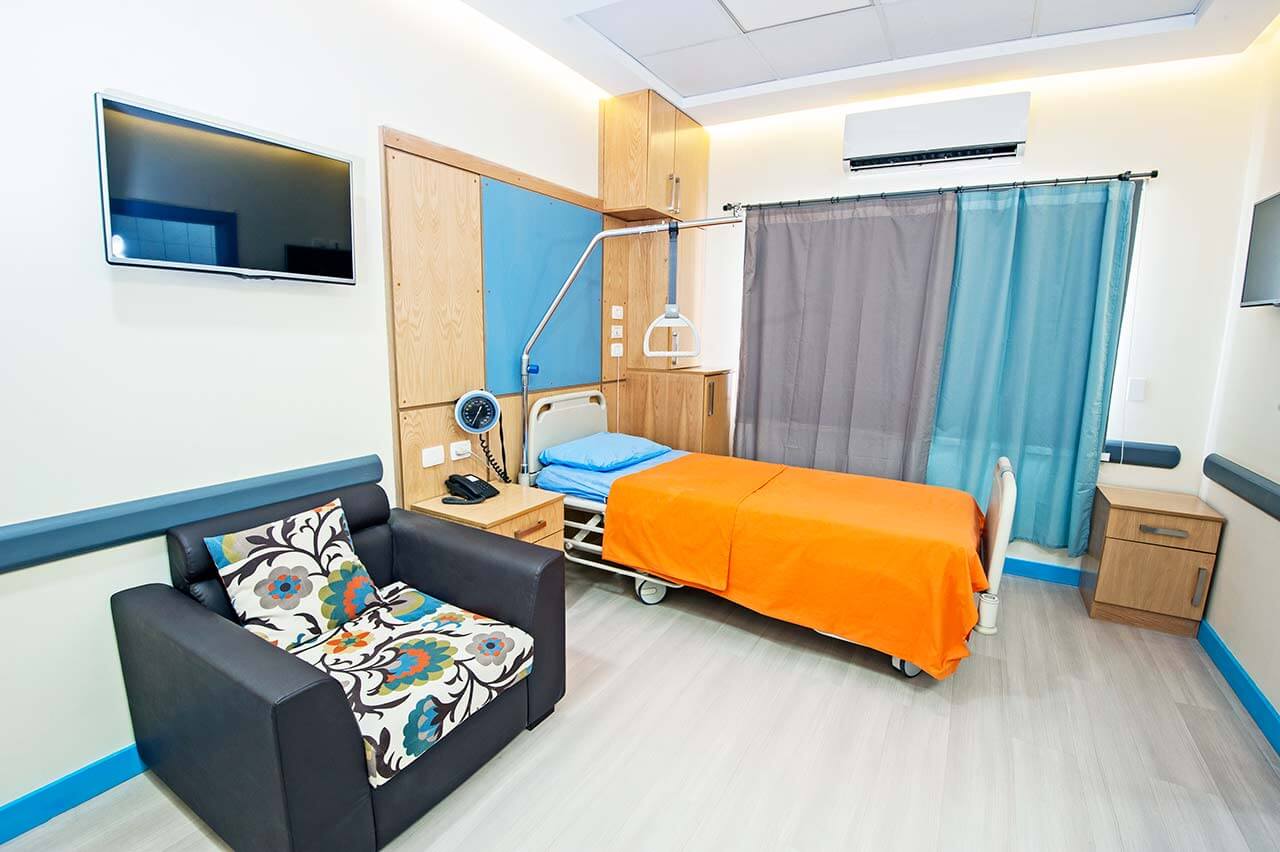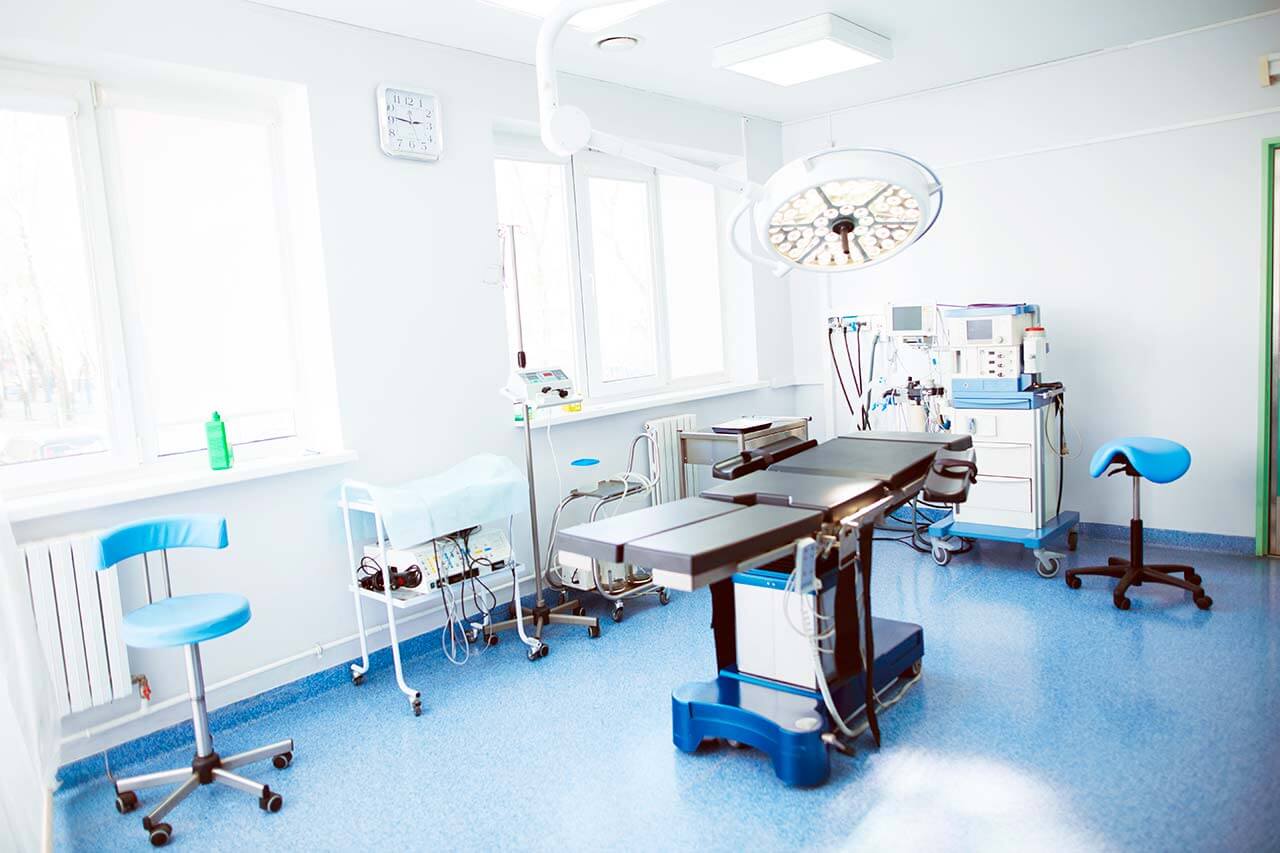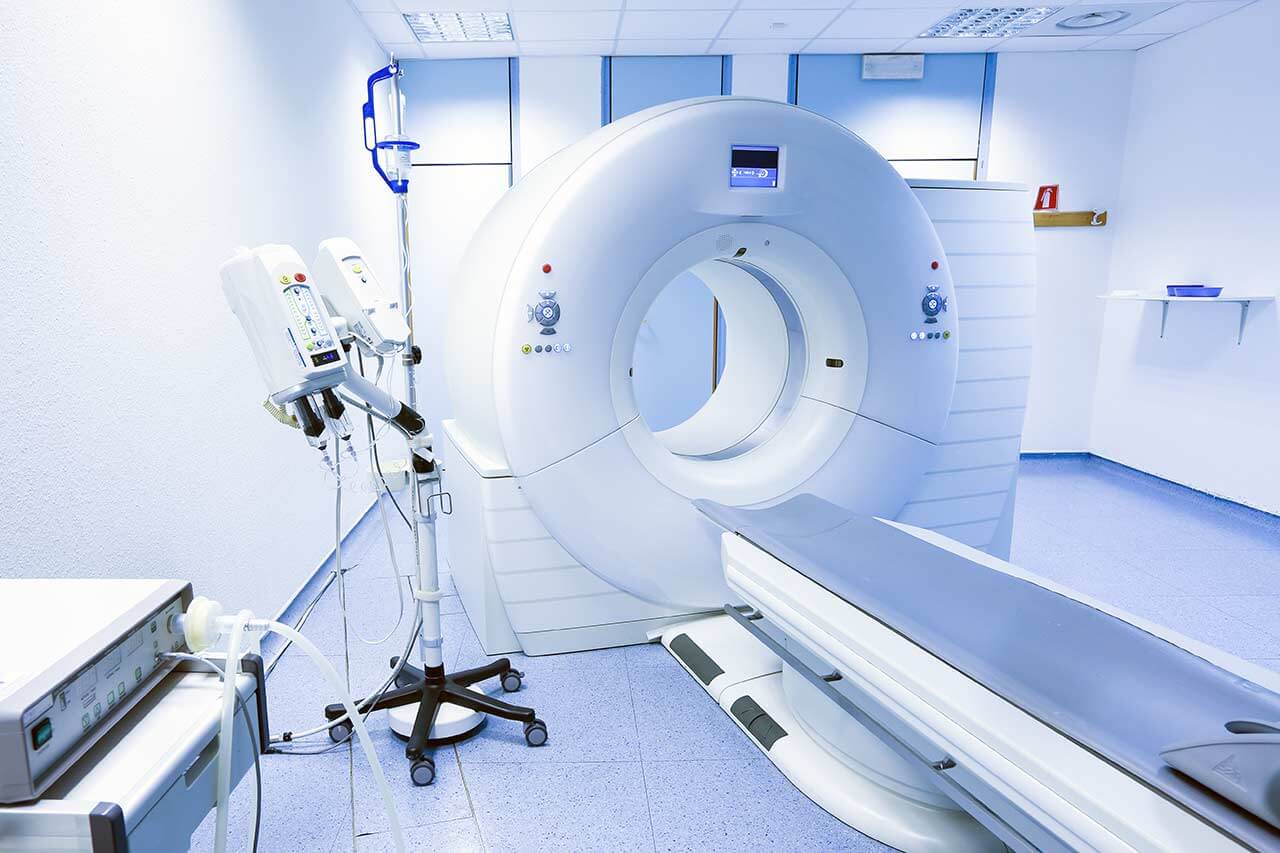
The program includes:
- Initial presentation in the clinic
- clinical history taking
- review of medical records
- physical examination
- laboratory tests:
- complete blood count
- biochemical analysis of blood
- inflammation indicators (CRP, ESR)
- TSH-basal, fT3, fT4
- indicators of blood coagulation
- CT planning of radiation therapy
- full course of conventional radiation therapy
- symptomatic treatment
- cost of essential medicines and materials
- nursing services
- control examinations
- consultations of related specialists
How program is carried out
During the first visit, the doctor will conduct a clinical examination and go through the results of previous laboratory tests and instrumental examinations. After that, you will undergo an additional examination, including complete blood count, laboratory assessment of liver and kidney function. Based on the received results, the physician will conduct radiotherapy planning with the help of CT or MRI, make the permanent tattoo marks on the skin and conduct CT simulation in order to assess the accuracy of the rays and the radiation dose. If necessary, related medical specialists will be involved in the elaboration of a treatment regimen (tumor board).
Radiation therapy is carried out as the day hospital procedure, without mandatory admission to the hospital. At each visit, the physician will assess your general condition and the marks on the skin. After that, you will be placed in a shielded radiation therapy room, on a special table.
Each radiation therapy session lasts less than half an hour (including preparation). All this time, doctors and nurses are monitoring your condition, you can communicate with them through a loudspeaker. The procedure is completely painless. Depending on the planned course of treatment, you will visit the hospital from 1 to 3-5 times a week.
After the completion of the radiation therapy course, you will undergo control examinations aimed at assessing your condition and efficacy of treatment. After that you will receive the medical report with detailed recommendations regarding further follow-up and treatment. In the future, you will be able to have a distant consultation with your attending physician and schedule the next course of treatment, if necessary.
Required documents
- Medical records
- MRI/CT scan (not older than 3 months)
- Biopsy results (if available)
Service
You may also book:
 BookingHealth Price from:
BookingHealth Price from:
About the department
The Department of Radiation Therapy at the Municipal Hospital Karlsruhe offers all modern types of radiation therapy for the treatment of oncological and benign pathologies. With an innovative technical base, the department performs intensity-modulated radiation therapy (IMRT), volumetric modulated arc therapy (VMAT), stereotaxy/radiosurgery, brachytherapy, combined chemoradiotherapy and radioimmunotherapy. Computer technology of the latest generation allows the doctors to carry out the treatment as accurately as possible, as well as to monitor and document the results obtained. The treatment regimen is planned in interdisciplinary collaboration with doctors from other medical specialties, taking into account the patient's individual needs and wishes. Whenever required, the experts from the University Hospital Heidelberg and the University Hospital Mannheim are engaged in the therapeutic process. The department has 29 beds for the accommodation of its patients. The department admits more than 700 inpatients and about 1,700 outpatients annually. The department is headed by Prof. Dr. med. Katja Lindel.
When a patient is admitted to the department, radiation therapists study his medical history and the results of previous examinations, if necessary, prescribing additional diagnostic procedures. After the doctor’s decision on the need for radiation therapy, the planning of the first procedure begins. Planning is carried out with the help of cutting-edge computed tomography. A radiation therapist sets the desired target volume of radiation in each slice, after which a 3D computer system is used to determine the most favorable location of the radiation fields. The therapy is followed by regular consultations to monitor the treatment outcomes.
The department's team of doctors most often resorts to external beam radiation therapy. They use intensity-modulated radiation therapy (IMRT), volumetric modulated arc therapy (VMAT), image-guided radiation therapy (IGRT) and 3D conformal radiation therapy. External beam radiation therapy involves the use of an external source of radiation, which is located at a certain distance from the human body. All types of external beam radiation therapy offered in the department are highly effective and sparing, since they allow delivering the maximum dose of radiation to the pathological focus, practically without affecting healthy tissues. As a rule, external beam radiation therapy is carried out on an outpatient basis. The session lasts 15-45 minutes; the duration of the exposure does not exceed several minutes, but it takes time to accurately position the patient and adjust the equipment for a specific exposure mode. External beam radiation therapy does not cause any pain, which is a great advantage for patients. Radiation can be given as monotherapy, but this is usually combined with chemotherapy, surgery, and other cancer treatments.
The department's specialists also successfully carry out contact irradiation – brachytherapy. This method of irradiation is highly accurate and involves the introduction of a radiation source directly into the oncological focus. Brachytherapy allows the doctor to target the tumor without damaging healthy adjacent tissues, which is its main advantage. The department provides all modern types of brachytherapy: intracavitary, intraluminal and interstitial. Depending on the particular type of cancer and the goals of treatment, the department's doctors may prescribe temporary or permanent brachytherapy. In the first case, the radiation source is placed in the neoplasm tissue for a certain period of time. Permanent brachytherapy involves the implantation of special radioactive "seeds" into the oncological focus, which remain there forever. Brachytherapy is most commonly used for prostate cancer treatment. The therapeutic procedure also gives good results for cervical, esophageal, rectal cancers, etc.
The medical facility also provides stereotactic radiosurgery. Despite its name, this therapeutic manipulation does not imply any invasive measures. The essence of radiosurgery is a single irradiation of the oncological focus with a high dose of ionizing radiation. In most cases, stereotactic radiosurgery is indicated for patients with brain tumors. Such treatment is also carried out for hard-to-reach tumors of other localizations, as an alternative to a surgical intervention.
The department specializes in radiation therapy for the treatment of the following diseases:
- Malignant diseases
- Breast cancer
- Prostate cancer
- ENT cancer
- Bowel cancer
- Esophageal cancer
- Anal cancer
- Lung cancer
- Brain tumors
- Lymphomas, plasmacytomas and leukemias
- Uterine and cervical cancers
- Sarcomas
- Skin cancer
- All types of metastases: metastases in bones, lymph nodes, brain, and soft tissues
- Benign diseases
- Degenerative inflammatory changes in the skeleton
- Heel spur
- Tennis elbow
- Knee, shoulder and hip arthrosis
- Endocrine ophthalmopathy
- Degenerative inflammatory changes in the skeleton
- Other benign and malignant pathologies
The department specializes in the following types of radiation therapy:
- External beam radiation therapy
- 3D conformal radiation therapy (3D-CRT)
- Intensity-modulated radiation therapy (IMRT)
- Volumetric modulated arc therapy (VMAT)
- Image-guided radiation therapy (IGRT)
- Contact radiation therapy
- Interstitial brachytherapy
- Intraluminal brachytherapy
- Intracavitary brachytherapy
- Stereotactic radiosurgery, in particular for small tumors of the brain and lungs, metastases in the brain, lungs and liver
- Total body irradiation (most common in leukemia)
- Other types of radiation therapy
Curriculum vitae
Since 1 January 2017, Prof. Dr. med. Katja Lindel has been heading the Department of Radiation Therapy at the Municipal Hospital Karlsruhe. Prior to this, the specialist held the position of Managing Senior Physician in the Department of Radiation Therapy at the University Hospital Heidelberg.
Prof. Katja Lindel received her medical education at the University of Muenster and has also trained in Switzerland and America. In 2000, she received her medical license. Her board certification in radiation therapy followed in 2004, and in 2010 she had her habilitation in the same field. In 2015, Dr. Katja Lindel held the position of an Extraordinary Professor.
Photo of the doctor: (c) Städtische Klinikum Karlsruhe
About hospital
The Municipal Hospital Karlsruhe is a modern maximum care medical facility, which combines a long tradition and the advanced achievements of modern medicine. The hospital operates on the basis of the University of Freiburg, so scientific innovations in the field of diagnostics and treatment are continuously introduced into practice here. The hospital presents almost all areas of modern medicine, including many medical services for young patients.
A highly qualified and experienced team of more than 4,500 employees provides impeccable medical care. The medical facility has 1,571 beds for the hospitalization of its patients. The hospital admits more than 63,000 inpatients and about 186,000 outpatients annually. A large number of patients wishing to receive medical care in the hospital speak for themselves and are a confirmation of the exceptional service, as well as the effectiveness of the treatment provided.
The quality management system of the hospital's medical care is certified in accordance with the DIN EN ISO 9001 standards. Since 2016, the hospital has implemented a regular quality control in compliance with the strict standards of the Initiative Quality Medicine (IQM). In addition, almost all departments of the hospital have numerous certificates in their areas of specialization, including certificates from the German Cancer Society (DKG), the German Society for General and Visceral Surgery (DGAV), the German Cardiac Society (DGK), the German Diabetes Society (DDG), the German Society of Nephrology (DGN), the German Trauma Society (DGU), etc.
The main value of the hospital's staff is the health and satisfaction of their patients, so a respect and a humane attitude towards each patient remain priorities. The doctors and nursing staff support each patient in every possible way on their path to recovery. The specialists also strive to perform the most sparing, but at the same time the most effective and safe treatment.
Photo: (с) depositphotos
Accommodation in hospital
Patients rooms
The patients of the Municipal Hospital Karlsruhe live in cozy patient rooms with everything necessary for a comfortable stay. Standard patient room furnishing includes an automatically adjustable bed, a bedside table, a TV, and a telephone. The patient rooms have Wi-Fi. Each patient room also has an ensuite bathroom with a shower and a toilet.
The patient rooms in the pediatric departments are specially designed for children, so that young patients feel at home. Children can live in their patient room with one of their parents. There are also special playrooms designed for children.
Meals and Menus
The patients of the hospital are offered tasty and varied three meals a day: breakfast, lunch and dinner. The menu also features dietary meals. The kitchen staff will gladly accept all the individual wishes of patients.
The hospital also has a cozy cafe where one can have a tasty snack, drink tea, coffee and soft drinks.
Further details
Standard rooms include:
Religion
The hospital has two chapels that regularly host Protestant, Catholic, and Ecumenical worship services. A patient can watch the broadcast of the worship on TV channels in his own room, if desired.
Accompanying person
Your accompanying person may stay with you in your patient room or at the hotel of your choice during the inpatient program.
Hotel
You may stay at the hotel of your choice during the outpatient program. Our managers will support you for selecting the best option.





